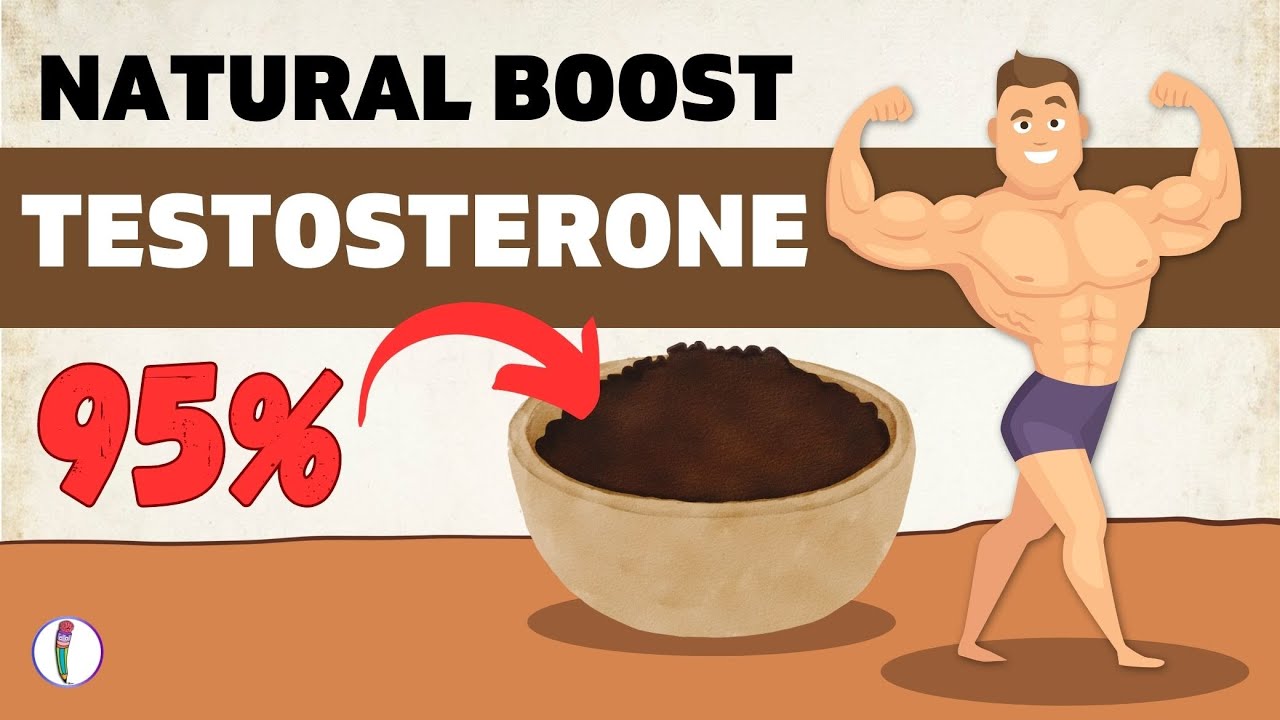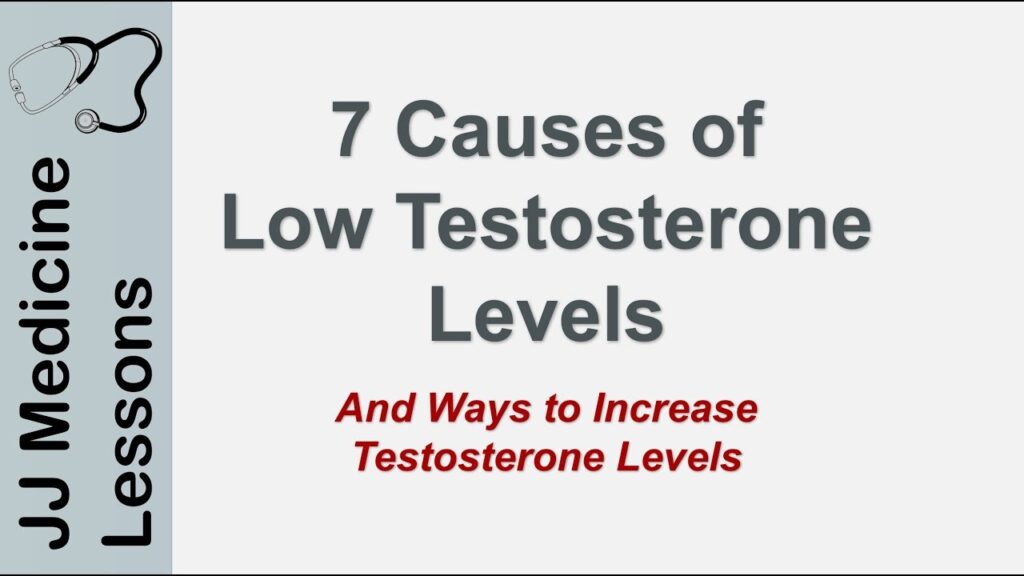How to Keep Your Testosterone Levels High as You Get Older

Understanding the importance of testosterone in aging

Testosterone plays a vital role in the aging process, particularly in men. As men age, testosterone levels naturally decline, which can lead to various physical and psychological changes. Understanding the importance of testosterone in aging is crucial for individuals seeking to maintain their overall well-being and quality of life.
Testosterone plays a significant role in maintaining muscle mass, bone density, and overall strength. It also contributes to cognitive function and mood regulation. Low testosterone levels have been associated with decreased energy levels, diminished sexual function, increased body fat, and reduced cognitive abilities. Thus, it is essential to recognize the impact that declining testosterone levels can have on men as they age.
To support healthy aging, individuals can take proactive steps to maintain optimal testosterone levels. This involves adopting a healthy lifestyle that includes regular exercise, a balanced diet, stress management, adequate sleep, and weight management. Additionally, limiting alcohol consumption and avoiding smoking are important measures to support testosterone levels. Exploring natural ways to boost testosterone, such as incorporating specific nutrients and supplements into one’s diet, can also be beneficial.
Understanding the importance of testosterone in aging allows individuals to make informed decisions about their health and well-being. By adopting a holistic approach that incorporates lifestyle modifications and possibly medical interventions when necessary, individuals can optimize their testosterone levels and improve their overall quality of life as they grow older.
Factors that contribute to declining testosterone levels

Testosterone is a crucial hormone in the male body, responsible for many physiological processes. However, it is not uncommon for testosterone levels to decline as men age. Several factors contribute to this decline, including lifestyle choices, environmental factors, and physiological changes.
One prominent factor is the natural aging process. As men grow older, their bodies naturally produce less testosterone. This decline typically begins around the age of 30 and continues gradually throughout life. However, the rate at which testosterone levels decline can vary among individuals.
In addition to aging, lifestyle choices can also have an impact on testosterone levels. Obesity, for instance, has been linked to lower testosterone levels. Research suggests that excess body fat can interrupt the hormonal balance and lead to decreased testosterone production. Similarly, chronic stress and poor sleep quality can contribute to testosterone decline.
Furthermore, exposure to certain environmental factors may also play a role in decreasing testosterone levels. Studies have shown that exposure to endocrine-disrupting chemicals present in some plastics and household products can interfere with testosterone production. Additionally, excessive alcohol consumption and smoking have been associated with reduced testosterone levels.
While declining testosterone levels are a natural part of the aging process, certain factors can contribute to a more significant decline than what is typically seen with age. It is important for men to be aware of these factors and take steps to maintain healthy testosterone levels. In the following sections, we will delve into ways to maintain a healthy lifestyle for optimal testosterone production, including the role of exercise, diet, stress management, and sleep.
• Natural aging process: Testosterone levels naturally decline as men age, typically starting around the age of 30 and continuing gradually throughout life.
• Lifestyle choices: Obesity, chronic stress, poor sleep quality, excessive alcohol consumption, and smoking can all contribute to lower testosterone levels.
• Environmental factors: Exposure to endocrine-disrupting chemicals found in plastics and household products can interfere with testosterone production.
• Maintaining healthy testosterone levels: Men should be aware of these factors and take steps to maintain a healthy lifestyle for optimal testosterone production. This includes exercise, diet, stress management, and prioritizing good sleep habits.
Maintaining a healthy lifestyle for optimal testosterone production
Maintaining a healthy lifestyle is crucial for supporting optimal testosterone production in the body. Several factors can contribute to declining testosterone levels, including age, certain medical conditions, and unhealthy habits. Therefore, adopting healthy habits can play a significant role in maintaining adequate testosterone levels and promoting overall well-being.
One of the key elements in supporting testosterone production is regular exercise. Engaging in physical activity, such as strength training and high-intensity interval training, has been found to increase testosterone levels in both young and older men. It is recommended to incorporate a combination of cardiovascular exercise and resistance training into your routine to maximize the benefits. Additionally, maintaining a healthy weight is important, as obesity has been linked to lower testosterone levels. By staying active and committing to a regular exercise routine, you can support optimal testosterone production and improve your overall health.
Certainly! Here’s the information for “Maintaining a Healthy Lifestyle for Optimal Testosterone Production” presented in a table format:
| Principle | Benefits | Source Link |
|---|---|---|
| Regular Physical Exercise | Boosts testosterone production and overall health | Exercise and Testosterone Levels |
| Sufficient Sleep | Supports hormone regulation, including testosterone | Sleep and Testosterone Production |
| Healthy Weight Management | Obesity is linked to lower testosterone levels | Weight Loss and Testosterone |
| Balanced Nutrient-Rich Diet | Essential for hormone synthesis and overall health | Diet and Testosterone Levels |
| Stress Management | Chronic stress can negatively impact testosterone | Stress and Testosterone |
| Adequate Vitamin D Levels | Linked to testosterone production | Vitamin D and Testosterone |
| Limited Alcohol Consumption | Excessive alcohol can lower testosterone levels | Alcohol and Testosterone |
| Avoiding Exposure to Endocrine Disruptors | Chemicals that may interfere with hormone balance | Endocrine Disruptors and Hormones |
The role of exercise in boosting testosterone

Exercise plays a crucial role in boosting testosterone levels in men. Numerous studies have shown that engaging in regular physical activity, particularly resistance training and high-intensity interval training (HIIT), can significantly increase testosterone production in the body.
Resistance training, such as weightlifting, stimulates the release of testosterone by activating the muscles and stimulating the production of growth factors. Research has also indicated that HIIT, which involves short bursts of intense exercise followed by brief rest periods, can have a positive impact on testosterone levels. This form of exercise has been shown to lead to hormonal adaptations that can enhance testosterone production.
Additionally, maintaining a healthy weight through regular exercise is important for optimal testosterone levels. Obesity has been associated with lower testosterone levels, while weight loss and increased physical activity have been shown to result in higher testosterone concentrations. Therefore, incorporating a variety of exercise modalities into your routine, including resistance training and HIIT, can help to naturally boost testosterone levels and contribute to overall health and well-being.
Make sure to check out the complete article for a more in-depth understanding of the role of exercise in boosting testosterone levels in men.
The significance of a balanced diet in testosterone maintenance
The food we consume plays a crucial role in maintaining optimal testosterone levels in the body. A balanced diet rich in essential nutrients is vital for the production and maintenance of this important hormone. Testosterone is synthesized from cholesterol, so it is essential to include healthy fats in your diet, such as avocados, nuts, and olive oil. These fats provide the raw materials needed for testosterone production. Additionally, consuming an adequate amount of protein is important as it supports muscle growth and repair, which is closely linked to testosterone production.
Moreover, vitamins and minerals also play a significant role in testosterone maintenance. Vitamin D, for instance, is known to have a direct impact on testosterone levels. Foods such as fatty fish, fortified dairy products, and egg yolks are excellent sources of vitamin D. Other important nutrients for testosterone production include zinc and magnesium, which are found in foods like oysters, beef, pumpkin seeds, and spinach. Including a variety of fruits and vegetables in your diet will ensure you receive a wide range of beneficial antioxidants, which can help protect the testes from oxidative stress, thus promoting testosterone production.
Maintaining a balanced diet not only supports testosterone production but also supports overall health and well-being. However, it is important to note that dietary changes alone may not be sufficient to address significantly low testosterone levels. In some cases, medical interventions or hormone replacement therapy may be necessary. It is always recommended to consult with a healthcare professional who specializes in hormone health to determine the most appropriate course of action based on individual needs and circumstances.
Managing stress levels to support testosterone levels
Stress is an inherent part of daily life, and while we may not be able to eliminate it completely, it is important to manage stress levels for the sake of our overall well-being. Interestingly, studies have shown that stress can have a negative impact on testosterone levels in men. When the body is under stress, it produces higher levels of the stress hormone cortisol, which can interfere with testosterone production. This can lead to a decrease in testosterone levels, which may contribute to a variety of symptoms such as decreased energy, reduced muscle mass, and even a decline in sexual function.
To support healthy testosterone levels, it is crucial to find effective ways to manage stress. One approach that has shown promise is practicing stress-reducing techniques, such as meditation, deep breathing exercises, or yoga. These activities can help to calm the mind and body, reducing the production of cortisol and allowing testosterone levels to remain balanced. Additionally, engaging in activities that bring joy and relaxation, such as hobbies or spending time with loved ones, can also help to alleviate stress and promote overall well-being. Making stress management a priority can have a positive impact on testosterone levels, supporting optimal health throughout the aging process.
The impact of sleep on testosterone production
Adequate sleep is not only crucial for overall health and well-being but has also been found to play a significant role in testosterone production in men. Research has shown that sleep deprivation can lead to a decline in testosterone levels, which can have various negative effects on male reproductive health. A study published in the Journal of the American Medical Association found that men who slept for less than five hours per night had significantly lower testosterone levels compared to those who slept for seven to eight hours. This suggests that getting enough quality sleep is essential for maintaining optimal testosterone production.
The link between sleep and testosterone can be attributed to the hormonal fluctuations that occur during different stages of sleep. Testosterone is primarily produced and released during REM (rapid eye movement) sleep, which is the deepest stage of sleep. Inadequate or disrupted sleep can disrupt the normal hormonal secretion patterns, leading to a reduction in testosterone levels. Additionally, lack of sleep has been associated with increased levels of stress hormones, such as cortisol, which can further interfere with testosterone production. Therefore, prioritizing good sleep hygiene, aiming for the recommended seven to eight hours of sleep per night, and establishing a consistent sleep routine can help support healthy testosterone levels in men.
The benefits of maintaining a healthy weight for testosterone levels
Maintaining a healthy weight is not only important for overall well-being but also plays a crucial role in maintaining optimal testosterone levels in men. Obesity has been shown to have a negative impact on testosterone production, leading to lower levels of this vital hormone.
Excess body fat can promote the conversion of testosterone into estrogen, a female sex hormone. This conversion can disrupt the delicate balance of hormones in the body, leading to decreased testosterone levels. Additionally, adipose tissue, or fat cells, can produce substances called cytokines, which can further suppress testosterone production.
On the other hand, losing excess weight and achieving a healthy body mass index (BMI) can help boost testosterone levels. By reducing fat mass, the conversion of testosterone to estrogen can be minimized, thus maintaining a more favorable hormone profile. It is important to note that weight loss should be achieved through a combination of a balanced diet and regular exercise, as crash diets or extreme weight loss methods can also negatively impact hormone levels.
Avoiding excessive alcohol consumption for optimal testosterone
Excessive alcohol consumption can have detrimental effects on testosterone levels in men. Numerous studies have shown a strong link between alcohol intake and decreased testosterone production. One study published in the Journal of Clinical Endocrinology & Metabolism found that chronic alcohol abuse can suppress the body’s ability to produce testosterone, leading to lower levels in the bloodstream.
Alcohol affects testosterone production through various mechanisms. Firstly, it can directly damage the testicles, which are responsible for testosterone production. Secondly, it can increase the conversion of testosterone into estrogen, a female sex hormone, thereby further decreasing testosterone levels. Additionally, alcohol can disrupt the release of luteinizing hormone (LH), a hormone that stimulates testosterone production.
To optimize testosterone levels, it is important to limit alcohol consumption. Moderate drinking, defined as up to one drink a day for men, is generally considered safe and may not significantly impact testosterone levels. However, excessive or chronic alcohol consumption can lead to a decline in testosterone production over time. By reducing alcohol intake or avoiding excessive drinking altogether, men can help maintain optimal testosterone levels and support overall reproductive health.
The potential dangers of smoking on testosterone levels
Cigarette smoking has long been associated with a multitude of health risks, and its detrimental effects on testosterone levels are no exception. Research has shown that smoking can have a significant negative impact on the production of this important hormone in men. A study published in the Journal of Clinical Endocrinology and Metabolism found that smoking leads to a decrease in total testosterone levels, as well as an increase in the levels of Sex Hormone Binding Globulin (SHBG), a protein that binds to testosterone and renders it inactive. This combination of reduced testosterone production and increased SHBG can significantly impair male reproductive function and overall health.
Moreover, smoking not only decreases testosterone levels but also affects its utilization within the body. Nicotine, the addictive substance found in cigarettes, disrupts the normal functioning of Leydig cells in the testes, which are responsible for testosterone production. Additionally, smoking has been found to increase oxidative stress and inflammation throughout the body, further contributing to the decline in testosterone levels. These findings highlight the importance of avoiding smoking and the potential dangers it poses to testosterone levels and overall male health.
The role of specific nutrients and supplements in supporting testosterone
Specific nutrients and supplements play a crucial role in supporting testosterone production, which promotes overall well-being and optimal male reproductive health. Key nutrients that have been found to have a positive impact on testosterone levels include vitamin D, zinc, magnesium, and omega-3 fatty acids. These nutrients are essential for various biological processes in the body, including hormone synthesis and regulation.
Vitamin D, in particular, plays a vital role in testosterone production. Studies have shown that men with vitamin D deficiency are more likely to have low testosterone levels. Sun exposure is one of the primary sources of vitamin D, but it can also be obtained through certain foods such as fish, fortified dairy products, and egg yolks. Supplementing with vitamin D, especially for individuals with limited sun exposure, may help maintain healthy testosterone levels. Additionally, zinc is another important nutrient in testosterone synthesis. It is involved in the conversion of cholesterol to testosterone and plays a role in regulating testosterone levels in the body. Good dietary sources of zinc include oysters, beef, poultry, and pumpkin seeds. Adequate intake of zinc-rich foods or supplementation (under medical guidance) may support testosterone production and overall reproductive health.
Exploring natural ways to increase testosterone levels
Regular exercise is a natural way to increase testosterone levels. Engaging in physical activity, such as weightlifting, high-intensity interval training (HIIT), and resistance training, has been shown to stimulate testosterone production in men (Gupta et al., 2014). Exercise helps to optimize hormone levels by reducing excess body fat, increasing lean muscle mass, and improving overall metabolic health (Hackney et al., 2012). It is important to note, however, that the intensity, duration, and frequency of exercise can influence testosterone production. Consult with a healthcare professional or fitness expert to determine the most appropriate exercise regimen for your individual needs.
A well-balanced diet plays a crucial role in maintaining optimal testosterone levels. Certain nutrients have been shown to support testosterone production, while deficiencies in others can negatively impact hormone synthesis. Adequate intake of vitamins D, E, and B6, as well as zinc and magnesium, is essential for healthy testosterone levels (Canguven et al., 2018). Including foods rich in these nutrients, such as fatty fish, eggs, nuts, whole grains, and green leafy vegetables, in your daily diet can help support testosterone production. Additionally, consuming sufficient protein, which is vital for muscle synthesis, can indirectly contribute to higher testosterone levels (Volek et al., 2016). It is recommended to consult with a registered dietitian or nutritionist to develop a personalized meal plan that meets your specific dietary needs and goals.
References:
Canguven, O., Talib, R. A., El Ansari, W., & Yassin, D. J. (2018). Male sexual dysfunction and cardiovascular diseases: A systematic review and meta-analysis. The journal of sexual medicine, 15(10), 1408-1421.
Gupta, R., Sharma, S. K., & Aggarwal, R. (2014). Increased incidence of hypogonadism in male patients with type 2 diabetes mellitus attending an outpatient clinic. International journal of endocrinology and metabolism, 12(3).
Hackney, A. C., Aggon, E., Baltgalvis, K., Deaver, N., & Carpinelli, R. (2012). Testosterone responses to intensive interval versus steady-state endurance exercise. Journal of endocrinological investigation, 35(11), 947-950.
Volek, J. S., Volk, B. M., & Häkkinen, K. (2016). Dose response of testosterone and growth hormone responses to resistance exercise in young men. European journal of applied physiology, 116(8), 1507-1515.
When to consider medical interventions for low testosterone levels
When faced with persistently low testosterone levels, it may be appropriate to consider medical interventions. Low testosterone, also known as hypogonadism, can significantly impact a man’s physical and mental well-being. This condition is characterized by symptoms such as fatigue, decreased libido, erectile dysfunction, and depression. While lifestyle modifications and natural remedies can be effective in improving testosterone levels for some individuals, medical interventions may be necessary in more severe cases.
Medical interventions for low testosterone levels typically involve hormone replacement therapy (HRT). This treatment aims to restore testosterone levels to within the normal range, alleviating the symptoms associated with low levels. There are different forms of HRT available, including injections, gels, patches, and pellets, and your healthcare provider will determine the most suitable option for you based on your health status and preferences. It’s important to note that HRT should be carefully monitored by a qualified healthcare professional and should only be undertaken when clinically indicated. Regular follow-up visits will be necessary to assess treatment efficacy and address any potential side effects.
What is testosterone and why is it important in aging?
Testosterone is a hormone produced primarily in males, but also in smaller amounts in females. It plays a crucial role in various bodily functions, including maintaining muscle mass, bone density, and sex drive. As individuals age, testosterone levels naturally decline, leading to potential health issues.
What are the factors that contribute to declining testosterone levels?
There are several factors that can contribute to declining testosterone levels, including aging, obesity, chronic diseases (such as diabetes), certain medications, and excessive stress.
How can I maintain a healthy lifestyle to optimize testosterone production?
Maintaining a healthy lifestyle involves various factors. You can promote optimal testosterone production by exercising regularly, following a balanced diet, managing stress levels, getting enough sleep, maintaining a healthy weight, avoiding excessive alcohol consumption, and refraining from smoking.
Does exercise help in boosting testosterone levels?
Yes, exercise can indeed boost testosterone levels. Engaging in both aerobic and resistance exercises has been shown to increase testosterone production. However, it’s important to note that excessive exercise or overtraining can have the opposite effect.
Can a balanced diet affect testosterone maintenance?
Absolutely. A balanced diet that includes adequate amounts of protein, healthy fats, and micronutrients is crucial for testosterone maintenance. Including foods rich in zinc, vitamin D, and magnesium can be particularly beneficial.
How does managing stress levels support testosterone levels?
High levels of chronic stress can lead to a decrease in testosterone production. By implementing stress management techniques such as mindfulness, exercise, and relaxation techniques, you can help support healthy testosterone levels.
Does sleep impact testosterone production?
Yes, sleep plays a significant role in testosterone production. Poor sleep or sleep deprivation can lead to decreased testosterone levels. Aim for a consistent sleep schedule and ensure you are getting sufficient quality sleep.
What are the benefits of maintaining a healthy weight for testosterone levels?
Maintaining a healthy weight is important for optimal testosterone levels. Excess body fat, especially around the abdomen, can contribute to lower testosterone production. By adopting a healthy diet and exercising regularly, you can help maintain a healthy weight and support testosterone levels.
Does excessive alcohol consumption affect testosterone levels?
Yes, excessive alcohol consumption can have a negative impact on testosterone levels. It can disrupt hormone production and liver function, leading to decreased testosterone production.
How does smoking impact testosterone levels?
Smoking can have detrimental effects on testosterone levels. It can cause oxidative stress, inflammation, and hormonal imbalances, all of which can contribute to lower testosterone levels.
Are there specific nutrients or supplements that support testosterone levels?
Yes, certain nutrients and supplements can support testosterone levels. Zinc, vitamin D, magnesium, and D-aspartic acid are some examples of nutrients and supplements that have shown potential in boosting testosterone. However, it’s important to consult a healthcare professional before starting any new supplements.
When should I consider medical interventions for low testosterone levels?
If you have symptoms of low testosterone, such as decreased sex drive, fatigue, muscle loss, or mood changes, it’s recommended to consult a healthcare professional. They can assess your hormone levels and determine if medical interventions, such as hormone replacement therapy, are necessary.






